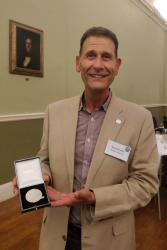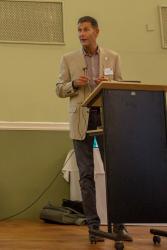Cydnabyddiaeth am gyfraniad oes at wyddor pysgod a physgodfeydd
Mae Gary Carvalho, Athro sŵoleg ym Mhrifysgol Bangor wedi derbyn Medal Beverton y Fisheries Society of the British Isles (FSBI) Medal am ei ymchwil sydd wedi torri tir newydd ac am ei gyfraniad oes i wyddor pysgod a physgodfeydd.
Medal Beverton yw gwobr uchaf y FSBI ac mae’n nodi’r Athro Carvalho fel wyddonydd o bwys. Bu Mae Medal Beverton yn nodi ymchwil Athro Carvbalho, sydd wedi torri tir newydd ac yn nodi ei gyfraniad oes i wyddor pysgod a physgodfeydd.’r Athro Carvalho yn mynychu Symposiwm yr FSBI yn ddiweddar er mwyn derbyn y fedal.
Mae Medal Beverton yn nodi ymchwil Athro Carvbalho, sydd wedi torri tir newydd ac yn nodi ei gyfraniad oes i wyddor pysgod a physgodfeydd.’r Athro Carvalho yn mynychu Symposiwm yr FSBI yn ddiweddar er mwyn derbyn y fedal.
Mae gwaith a diddordebau ymchwil yr Athro Carvalho yn cwmpasu datblygiad a defnydd technegau DNA i asesu sut y mae pysgod a rhywogaethau dyfrol eraill yn ymateb i’r amgylchedd dros cyfnodau amser byr a maith. Mae’n defnyddio’r gwybodaeth genynnol hyn i adnabod ac asesu rhywogaethau ar gyfer cadwraeth, rheolaeth pysgodfeydd yn ogystal ag er mwyn gwarchod y cwsmer, ac yn fwy diweddar, er mwyn asesu iechyd cymunedau unigol o bysgod drwy archwilio’r pysgod unigol gan ddefnyddio’r microbiome.
Meddai’r Athro Carvalho:
“Mae derbyn medal Beverton, ynghyd a chydnabyddiaeth cydweithwyr ym maes gwyddoniaeth wrth gwrs yn anrhydedd fawr It is of course a great honour to receive the Beverton Medal and recognition from colleagues and peers working in fisheries science.
In collaboration with numerous students and collaborators across the years, we applied a range of genetic tools across many different fish species to tackle problems in fish conservation and management. Many of our studies showed that marine fish populations were divided frequently into smaller, locally adapted and biologically distinct units. Such evidence helped to shift the spatial scale that managers could regulate and enforce conservation measures. Understanding the distribution and abundance of such population diversity or “genetic resources” enhances our ability to fish at sustainable levels as well as promote stock recovery. Such contributions collectively increase crucial dialogue between fisheries scientists and policy makers. Discussion helps us to design more effective genetic and other tools for application in relation to future challenges of environmental change and overexploitation.”
 Rhoddodd Athro Carvalho anerchiad wrth dderbyn y Fedal.Since his appointment to Bangor University in 2005 Prof Carvalho has led the Molecular Ecology and Fisheries Genetics Laboratory (MEFGL), which is now among the largest European groups focusing on the molecular ecology and evolution of aquatic life.
Rhoddodd Athro Carvalho anerchiad wrth dderbyn y Fedal.Since his appointment to Bangor University in 2005 Prof Carvalho has led the Molecular Ecology and Fisheries Genetics Laboratory (MEFGL), which is now among the largest European groups focusing on the molecular ecology and evolution of aquatic life.
Prof Carvalho is a Fellow of the Linnean Society and of the Society of Biology and serves on various national and international Committees including as a member of several governmental and other advisory groups.
Dyddiad cyhoeddi: 17 Gorffennaf 2018
